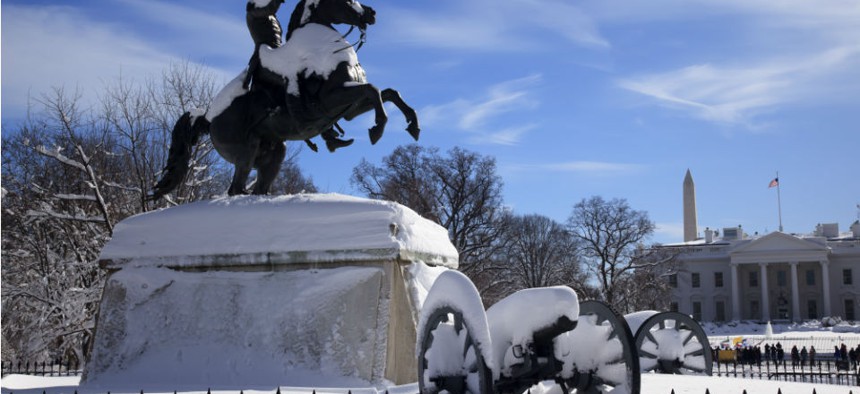
Bill Perry / Shutterstock.com
OPM Changes Snow Day Leave Policy
Feds scheduled to be on vacation or sick leave when Washington-area offices close because of an emergency now won’t get an automatic excused absence.
Federal employees scheduled to be on vacation or sick leave when Washington-area federal offices close because of bad weather now will be charged for that leave, under a new policy from the Office of Personnel Management.
The change is necessary to reflect the 21st century mobile workplace, according to OPM. Even when the government is officially closed, federal agencies technically are still operating because many employees can telework. In the past, when agencies closed because of inclement weather or another emergency, the day was considered a “non-workday.” On a non-workday, an employee with pre-approved annual or sick leave automatically received an excused absence instead of being charged for leave.
The 2010 Telework Enhancement Act requires all agencies to incorporate telework into their continuity of operations plans, so the “justification for providing excused absence to employees on pre-approved paid leave became obsolete,” OPM said in its December 2014 guide on Washington, D.C. Area Dismissal and Closure Procedures. “Since it is no longer a non-workday for federal employees, we are canceling that policy,” said Brenda Roberts, OPM’s deputy associate director of pay and leave, during a Dec. 17 OPM webcast on the topic.
Employees scheduled for leave on days when federal offices close can choose to telework that day, if that is an option for them, and won’t be charged for taking annual leave. “OPM advises that the general practice moving forward will be for employees on pre-approved leave to either telework or remain on leave when federal offices are closed, subject to agency policy, and in accordance with any applicable collective bargaining agreement (as consistent with law),” the guide stated. In addition, OPM “encourages agencies to require telework-ready employees who are permitted to use unscheduled telework to be required to telework on closure days,” the guide said.
Federal workers and agencies need to be well-versed on their telework status and policies before an emergency happens, so they know whether they have to work or not when the government’s operating status is disrupted, Roberts said.
As for pre-approved sick leave, if an employee had scheduled sick leave for a medical appointment on a day when Washington-area offices closed for an emergency, and the doctor canceled the appointment, then the employee would not be charged for sick leave. That is, of course, unless the employee is required to telework, in which case the employee must work from home or else take leave. The OPM guide provides a few examples of leave scenarios to illustrate the policy change.
True “snow days” are quickly becoming a thing of the past for all workers, including federal employees, as telework becomes more commonplace, particularly in the Washington region. Agencies outside of the Washington area can follow OPM’s lead or make their own decisions. OPM determines the operating status for all agencies and offices located in the D.C. area, while local Federal Executive Boards make the call for employees located throughout the rest of the country. The government has several options when determining its operating status. For example, agencies can be open with the option of unscheduled leave or unscheduled telework; open with delayed arrival; closed; or operating under early dismissal, which in turn affects employees’ work schedules.
OPM works with several local and state agencies, as well as other federal partners like the National Weather Service, when weighing whether to close Washington-area federal offices because of inclement weather. The agency takes into account when and where poor conditions will materialize, and whether they will coincide with rush hour. The Washington Metropolitan Area Transit Authority is also part of the conversation since so many federal employees take public transit to and from work. Staggered early dismissal times are important to keep the system from being overloaded and ensuring people get home safely and quickly during bad weather, said Caroline Laurin, WMATA’s deputy chief spokeswoman, during Wednesday’s webcast.
OPM has a 24-hour situation room that monitors anything that affects the status of the federal government, said Dean Hunter, the agency’s director of facilities, security, and contracting, during the webcast. Hunter said OPM wants to make the decision on operating status “as early as we possibly can” but that “there really needs to be a rightness and a confidence associated with that forecast so that we know we are making the right decision at that point in time.” Hunter said phone calls with about 200 participants to discuss whether the federal government will remain open the following day might happen at 9 p.m. the night before, but often fluid circumstances and the volatility of Mother Nature means that call takes place at 3 a.m. Then OPM tries to disseminate the information to the rest of the government and the public by 4 a.m.
Last winter was pretty eventful weather-wise; OPM made 12 decisions related to the government’s operating status in the Washington region. There were five closures, four unscheduled leave/unscheduled telework announcements and three delayed arrivals.
As for this winter, so far, “there’s not a clear signal that we are going to end up one way or another,” said Chris Strong, warning coordination meteorologist for the National Weather Service.
(Image via Bill Perry / Shutterstock.com)







